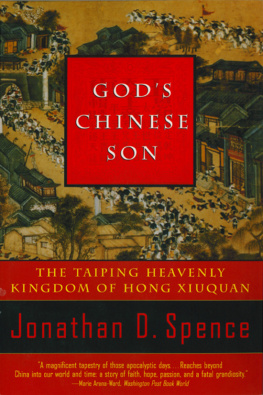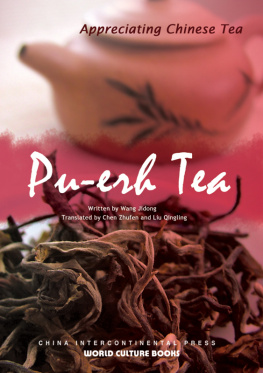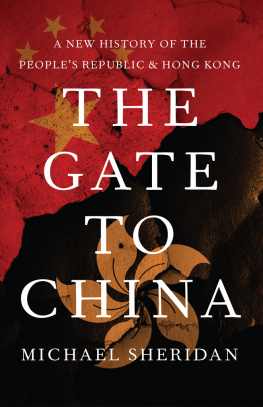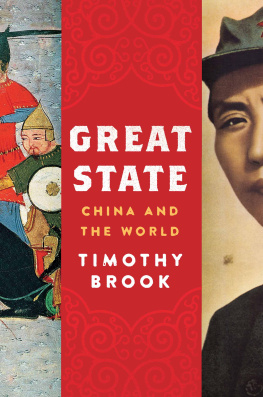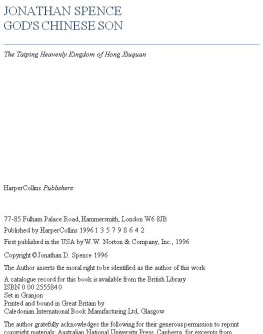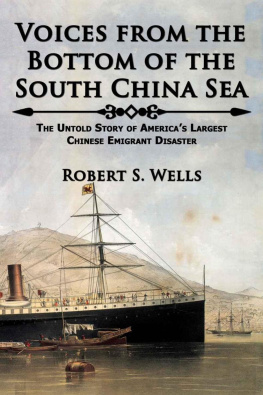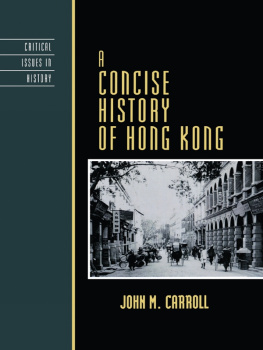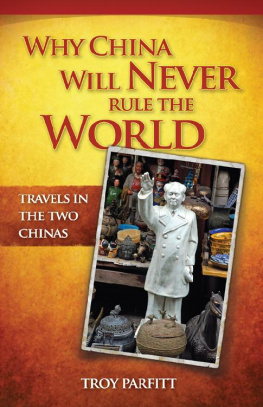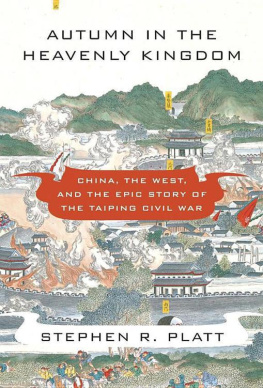
... and there shall be
Beautiful things made new, for the surprise
Of the sky-children.
John Keats, Hyperion
Contents

Frontispiece
In my struggle to understand the multileveled worlds of Hong Xiuquan, I have been helped by many friends and scholars. They need feel no responsibility for the way this book is shaped, nor for the errors of fact or fancy that it may contain, but I trust they will accept my gratitude. During two visits I made to Beijing in 1991 and 1993, and subsequently on his own visits to the United States, Wang Qingcheng was a particularly generous guide, sharing his own voluminous Taiping works, answering my endless questions, and introducing me to his former dissertation student Xia Chuntao, whose own knowledge and generosity thenceforth were equally boundless. It was thanks to Wang Qingcheng also that my wife, Chin Annping, and I were able to meet several of her grandfather Chin Y-fus former colleagues and students, giving us a sense of the powerful impressions that great scholar left behind him. Wang also introduced me to another leading Taiping scholar, Zhong Wendian, who looked after me in Guilin, and taught me much of the Hakka point of view. It was Zhong Wendian who in turn eased my route toward Guiping, and introduced me to my Jintian guide Huang Weilin. And it was thanks to Huang that for the first (and last) time I was able to sample the odorous Guiping lizard wine, and in his company in the mud and sultry heat of a Guangxi summer day that I saw the ribbon waterfalls flickering through the dense foliage in the foothills of Thistle Mountain. In Nanjing, it was Mao Jiaqi and Zhu Qingbao who served as my guiding spirits as I searched in the sprawling, smog-filled, broiling Yangzi city for echoes of the vanished New Jerusalem. And as if to round off all those quests, it was Willie Ruff in his flame-red Porsche who blared me into Shelbyville, Tennessee, on another summers day, to show me where the Baptist preacher Issachar Jacox Roberts stretched his spiritual muscles in the 1830s, before he heeded the call to China, and received his chance to teach the Bible to the future Taiping Heavenly King.
My special thanks also to Judy Chiu-ti Liu, whose combination of knowledge in Chinese Christian sources and classical Chinese made her an invaluable guide both to the newly discovered Taiping prophetic books and to the tracts of the early Protestant convert Liang Afa; to Laura McDaniel, for exploring the Baptist archives in search of Roberts, and the National Archives in search of renegades and diplomats; and to Min Ye, Richard Menard, Hong Xiang and her husband, Che Wei, Liang Kan, Wen-wen Liu, Yar and Mei Woo, Nicholas Spence, and others who helped with leads and translation. The staffs of many institutions and libraries were constantly helpful, not only in the various Yale collections, but in Harvard, New York, and Washington, D.C., and overseas, especially at the Oriental and India Office collections of the British Library in London (where Frances Wood, Linda Raymond, and Graham Hutt all went out of their way to help), at the British Library newspaper depository in Colindale, at the School of Oriental and African Studies in the University of London, at the Public Record Office in Kew Gardens, and in the Department of Prints and Drawings in the Victoria and Albert Museum. In Taiwan, I benefited from exploring holdings at the Academia Sinica and at the Palace Museum, and received much help from Chuang Chi-fa, Chen Kuo-tung, and Wang Ai-ling. At various lectures too, in Academia Sinica as at Bryn Mawr, Harvard, Washington University in St. Louis, and McGill, scholarly questions or follow-up correspondence gave me new ideas or corrected old errors.
Among experts on the Taiping period or religious fundamentalism who answered my letters of inquiry or shared their own riches of information were Stephen Averill, Richard Bohr, Ralph Covell, Joseph Davis, William Doezema, Linda Gerstein, Norman Girardot, Steven Leibo, Jessie Lutz, Susan Naquin, Eileen Scully, Audrey Spiro, J. Barton Starr, Barend ter Haar, and Yu Chun-fang. In Melbourne, Jack Gregory shared his thoughts and also gave me a precious copy of the invaluable book he and Prescott Clarke compiled on Western reports on the Taiping; in London, R. G. Tiedemann shared information from his ever-growing and long-awaited bibliography of Western-language materials on the Taiping; and on various occasions Rudolf Wagner shared his great knowledge of esoteric sources and unexplored archival treasures (which were sometimes in ones own backyard).
Some of the research, and much of the traveling and thinking that led at last to this book, were conducted while I was on a MacArthur fellowship. The parts that I wrote then I have now abandoned, but false starts are part of most absorbing ventures, and I am grateful to that free-fall fellowship for making such a period of experimentation possible. The chaos of my longhand drafts was reduced to order by the calm intelligence of my typist Peggy Ryan. Betsy McCaulley kept the world at bay when it had to be so. At Norton, both Donald Lamm and Steven Forman encouraged this project from its inception, and managed to keep me hard at work by the level of their excitement rather than by invocation of deadlines. And Chin Annping, through her love, energy, and unflagging common sense, ensured that I could be totally absorbed by Hong Xiuquan but not ensnared.
The story of Hong Xiuquan and his Taiping Heavenly Kingdom is as strange as any to be found in Chinese history. Born early in the nineteenth century to a South China farming family of modest means, and for a time employed as a village schoolteacher, Hong soon found himself caught up in the turbulent crosscurrents of Western ideas that were being introduced to China during his youth. Of these, the most important to his fate were certain strands of Christian doctrine that had been translated into Chinesealong with the Bibleby a dedicated group of Protestant missionaries and their local converts. Some intersection of Hongs own mind and the pulse of the times led him to a literal understanding of elements of this newly encountered religion, so that the Christian texts he read convinced him that he was the younger brother of Jesus, imbued by his Father God with a special destiny to rid China of the conquering Manchu demon race, and to lead his chosen people to their own Earthly Paradise.
Borne aloft on the wings of such millenarian belief, Hong began late in the 1840s to assemble an army of the God-worshiping faithful, who by 1850 had coalesced into the Taiping Heavenly Army. It was at the head of this army that Hong fought his destructive yet triumphant way through southern and central China, until in 1853 his combined forces seized the mighty Yangzi River city of Nanjing. Here, in a community that was at once scriptural, imagined, and rooted in the soil, they created their Taiping New Jerusalem, which remained their base for eleven years until in 1864after twenty million people or more in the regions under their sway had lost their lives in battle or from starvationHong and the remnants of his army perished in their turn from famine, fire, and sword.
The roots of the apocalyptic visions that led Hong and his followers to this passionate catastrophe go back to the second millennium B.C. Before their emergence in that time period a different pattern of belief had prevailed in many culturesmost prominently the Egyptian, the Mesopotamian, and the Indo-Iranian. According to this prior understanding, the universe displayed a delicate but sustainable balance between the forces of order and prosperity on the one hand and the forces of darkness, chaos, and destruction on the other. In the words of
Next page
